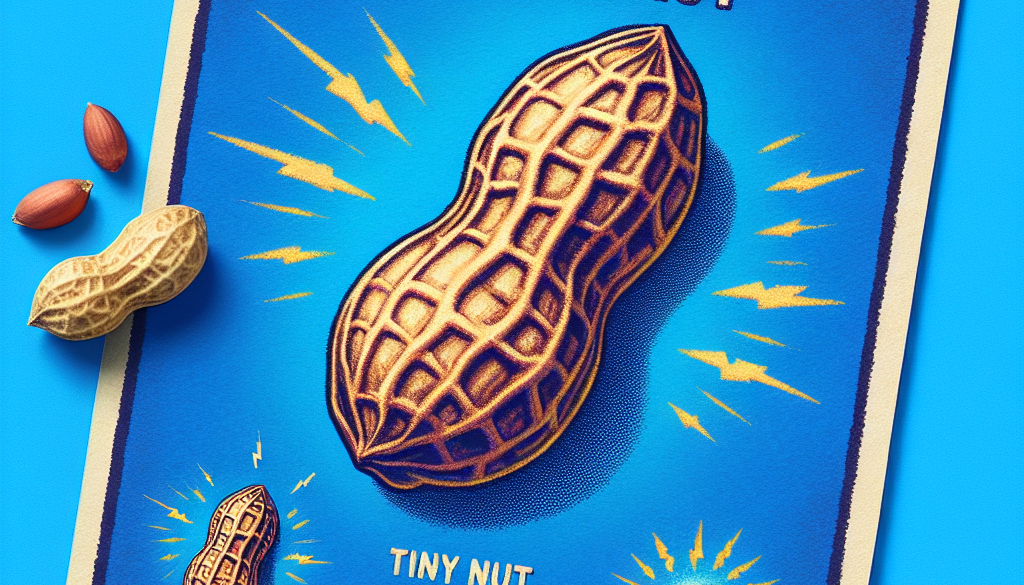Calories 1 Peanut: Tiny Nut, Big Energy
-
Table of Contents
Calories in 1 Peanut: Tiny Nut, Big Energy

When it comes to snacking, peanuts are a popular choice for many. They’re not only delicious but also packed with energy and nutrients. Despite their small size, peanuts have a significant caloric content that can provide a quick energy boost. In this article, we’ll delve into the world of peanuts, exploring their caloric value, nutritional benefits, and how they can fit into a balanced diet.
The Nutritional Profile of a Peanut
Peanuts, despite being called nuts, are actually legumes. They grow underground and are part of the family that includes beans and lentils. However, their nutritional profile is similar to that of tree nuts like almonds and walnuts. One peanut may seem insignificant, but it contains a surprising amount of energy and nutrients.
- Calories: A single peanut contains approximately 5 to 6 calories.
- Protein: Peanuts are a good source of plant-based protein, with one peanut providing about 0.25 grams.
- Fats: The majority of the calories in peanuts come from fats, particularly heart-healthy monounsaturated and polyunsaturated fats.
- Fiber: Peanuts contain dietary fiber, which is essential for digestive health.
- Vitamins and Minerals: Peanuts are rich in B vitamins, vitamin E, magnesium, phosphorus, and potassium.
Health Benefits of Peanuts
Peanuts are not just calorie-dense; they also offer a variety of health benefits. Regular consumption of peanuts has been linked to a reduced risk of heart disease, thanks to their monounsaturated and polyunsaturated fat content. They also contain antioxidants, which help fight free radicals in the body, potentially reducing the risk of chronic diseases.
- Heart Health: The healthy fats in peanuts can lower bad cholesterol levels and improve heart health.
- Weight Management: Peanuts have a high satiety value, meaning they can keep you feeling full for longer, which can help with weight management.
- Protein Power: As a plant-based protein source, peanuts can support muscle repair and growth.
- Blood Sugar Control: The fiber and protein in peanuts help regulate blood sugar levels, making them a good snack for people with diabetes.
Caloric Impact of Peanuts in the Diet
While peanuts are energy-dense, they can still be part of a healthy diet when consumed in moderation. The key is to be mindful of portion sizes. A handful of peanuts (about 28 grams or roughly 28 peanuts) contains around 160 calories. This portion can provide a satisfying snack that contributes to your daily nutritional needs without excessive calorie intake.
Incorporating Peanuts into Your Diet
There are many ways to enjoy peanuts and reap their health benefits. Here are some ideas:
- As a snack: Eat a small handful of peanuts between meals to curb hunger.
- In meals: Sprinkle chopped peanuts over salads, stir-fries, or noodles for added crunch and nutrition.
- As peanut butter: Spread natural peanut butter on whole-grain toast or add it to smoothies for a protein boost.
- In desserts: Use peanuts as a topping for healthy desserts like yogurt or fruit salads.
Considerations and Allergies
While peanuts are nutritious, they are also one of the most common food allergens. Individuals with peanut allergies should avoid peanuts and peanut-containing products entirely. For those who can safely consume peanuts, it’s important to choose unsalted and unflavored varieties to minimize sodium and added sugars.
Conclusion: The Mighty Peanut
In conclusion, the humble peanut is a powerhouse of energy and nutrients. Despite its small size, a single peanut contains enough calories and nutrients to make a significant contribution to your diet. When enjoyed in moderation, peanuts can be a healthy addition to your diet, offering benefits for heart health, weight management, and more.
Discover ETprotein’s High-Quality Protein Products
If you’re looking to incorporate more plant-based proteins into your diet, ETprotein offers a range of high-quality protein products. Their selection includes organic rice protein, clear rice protein, pea protein, clear pea protein, pumpkin seed protein, sunflower seed protein, mung bean protein, and peanut protein. These products are non-GMO, allergen-free, and have a neutral taste, making them perfect for various applications in the food and beverage industry.
ETprotein is a trusted manufacturer and supplier, serving a global clientele with top-notch protein solutions. Whether you’re a distributor, trader, or manufacturer, ETprotein can meet your protein needs with their extensive product range. For more information or to sample their products, reach out to ETprotein today.
About ETprotein:
ETprotein, a reputable protein Chinese factory manufacturer and supplier, is renowned for producing, stocking, exporting, and delivering the highest quality organic bulk vegan protein and plant proteins. They include Organic rice protein, clear rice protein, pea protein, clear pea protein, pumpkin seed protein, sunflower seed protein, mung bean protein, peanut protein etc. Their offerings, characterized by a neutral taste, non-GMO, allergen-free attributes, cater to a diverse range of industries. They serve nutraceutical, pharmaceutical, cosmeceutical, veterinary, as well as food and beverage finished product distributors, traders, and manufacturers across Europe, USA, Canada, Australia, Thailand, Japan, Korea, Brazil, and Chile, among others.
ETprotein specialization includes exporting and delivering tailor-made protein powder and finished nutritional supplements. Their extensive product range covers sectors like Food and Beverage, Sports Nutrition, Weight Management, Dietary Supplements, Health and Wellness Products, and Infant Formula, ensuring comprehensive solutions to meet all your protein needs.
As a trusted company by leading global food and beverage brands and Fortune 500 companies, ETprotein reinforces China’s reputation in the global arena. For more information or to sample their products, please contact them and email sales(at)ETprotein.com today.














